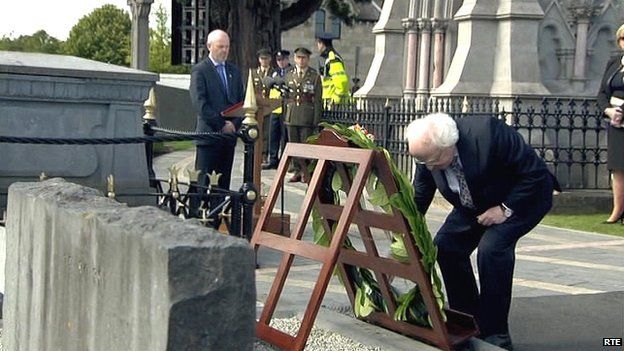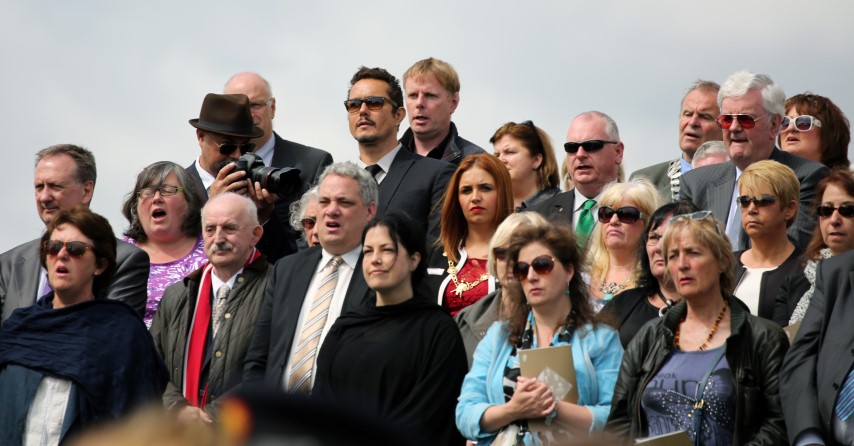

Today, as Vice-President of the Somme Association, President of the Ullans Academy and Patron of the Dalaradia organisation, I attended, with a senior colleague, the State Commemoration of the funeral of Jeremiah O’Donovan Rossa in Glasnevin Cemetery, Dublin. I had been invited by Heather Humphreys, T.D. on behalf of the government of the Irish Republic, this being the start of the official calendar marking the 100th anniversary of the events of 1916.
The Irish president Michael D. Higgins, prime minister Enda Kenny, the Lord Mayor of Dublin, Chriona Ní Dhálaigh and government ministers took part. Although he died in exile in 1915, the Fenian leader, who fought for Irish independence, was buried in Dublin’s Glasnevin Cemetery. His original funeral is seen as a pivotal moment in Irish history. Several of those who attended went on to take part in the 1916 Easter Rising.
Fifteen hundred members of the public who applied for tickets attended. Members of the diplomatic corps, including from the UK, were in attendance as well as members of the extended O’Donovan Rossa family whose ancestor spent long periods in British jails for his activities. Large screens showed the event outside the cemetery where there was a public viewing area, with spaces for up to 5,000 people.
In the 1850s, O’Donovan Rossa was sworn into the Irish Republican Brotherhood (IRB) known colloquially as the Fenians, a reference to Na Fianna, the legendary band of Gaelic warriors who had conquered Ireland from our Cruthin and Belgic ancestors in Irish mythology. The IRB was a small, secret, revolutionary body committed to the use of force to establish an independent Irish republic.
O’Donovan Rossa was imprisoned in various jails in England for his activities and later moved to New York following his release, continuing his efforts to oppose British rule in Ireland. After his death, his remains were brought to Ireland by the American liner St Paul from New York to Liverpool. They were then transferred to the steamer Carlow, which carried them to Dublin.
At the original funeral, the Easter Rising leader Padraig Pearse delivered the oration as follows and this was enacted beautifully by Jim Roche today.
It has seemed right, before we turn away from this place in which we have laid the mortal remains of O’Donovan Rossa, that one among us should, in the name of all, speak the praise of that valiant man, and endeavour to formulate the thought and the hope that are in us as we stand around his grave. And if there is anything that makes it fitting that I, rather than some other, rather than one of the grey-haired men who were young with him and shared in his labour and in his suffering, should speak here, it is perhaps that I may be taken as speaking on behalf of a new generation that has been re-baptised in the Fenian faith, and that has accepted the responsibility of carrying out the Fenian programme. I propose to you then that, here by the grave of this unrepentant Fenian, we renew our baptismal vows; that, here by the grave of this unconquered and unconquerable man, we ask of God, each one for himself, such unshakable purpose, such high and gallant courage, such unbreakable strength of soul as belonged to O’Donovan Rossa.
Deliberately here we avow ourselves, as he avowed himself in the dock, Irishmen of one allegiance only. We of the Irish Volunteers, and you others who are associated with us in to-day’s task and duty, are bound together and must stand together henceforth in brotherly union for the achievement of the freedom of Ireland. And we know only one definition of freedom: it is Tone’s definition, it is Mitchel’s definition, it is Rossa’s definition. Let no man blaspheme the cause that the dead generations of Ireland served by giving it any other name and definition than their name and their definition.
We stand at Rossa’s grave not in sadness but rather in exaltation of spirit that it has been given to us to come thus into so close a communion with that brave and splendid Gael. Splendid and holy causes are served by men who are themselves splendid and holy. O’Donovan Rossa was splendid in the proud manhood of him, splendid in the heroic grace of him, splendid in the Gaelic strength and clarity and truth of him. And all that splendour and pride and strength was compatible with a humility and a simplicity of devotion to Ireland, to all that was olden and beautiful and Gaelic in Ireland, the holiness and simplicity of patriotism of a Michael O’Clery or of an Eoghan O’Growney. The clear true eyes of this man almost alone in his day visioned Ireland as we of to-day would surely have her: not free merely, but Gaelic as well; not Gaelic merely, but free as well.
In a closer spiritual communion with him now than ever before or perhaps ever again, in a spiritual communion with those of his day, living and dead, who suffered with him in English prisons, in communion of spirit too with our own dear comrades who suffer in English prisons to-day, and speaking on their behalf as well as our own, we pledge to Ireland our love, and we pledge to English rule in Ireland our hate. This is a place of peace, sacred to the dead, where men should speak with all charity and with all restraint; but I hold it a Christian thing, as O’Donovan Rossa held it, to hate evil, to hate untruth, to hate oppression, and, hating them, to strive to overthrow them. Our foes are strong and wise and wary; but, strong and wise and wary as they are, they cannot undo the miracles of God who ripens in the hearts of young men the seeds sown by the young men of a former generation. And the seeds sown by the young men of ’65 and ’67 are coming to their miraculous ripening to-day. Rulers and Defenders of Realms had need to be wary if they would guard against such processes. Life springs from death; and from the graves of patriot men and women spring living nations. The Defenders of this Realm have worked well in secret and in the open. They think that they have pacified Ireland. They think that they have purchased half of us and intimidated the other half. They think that they have foreseen everything, think that they have provided against everything; but the fools, the fools, the fools! — they have left us our Fenian dead, and while Ireland holds these graves, Ireland unfree shall never be at peace.
In his welcoming speech, John Green, Chairman of the Glasnevin Trust put these words in context, as O’Donovan Rossa later thought differently about his role as an “unrepentant Fenian”, repudiating violence and supporting the John Redmond ideal of Home Rule for Ireland rather than that Pearse ideal, based on Gaelic nationalism, which seems so out-of-date today.